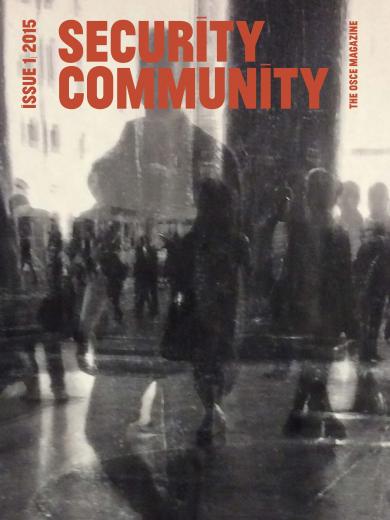The OSCE in Ukraine Update: December 2014 to June 2015
Mediation and Negotiation
The OSCE Chairperson-in-Office (CiO), Serbia’s First Deputy Prime Minister and Foreign Minister Ivica Dačić, is using every opportunity to urge all sides to fulfill their obligations under the Package of Measures on the Implementation of the Minsk Agreements, which the leaders of France, Germany, Russia and Ukraine agreed during their meeting in the Normandy format on 12 February.
In support of the OSCE Chairmanship, OSCE Secretary General Lamberto Zannier repeatedly visited Ukraine. He discussed the situation and the OSCE’s role in maintaining open and inclusive dialogue during numerous high-level meetings with relevant actors.
The CiO re-appointed Swiss diplomat Heidi Tagliavini as his Special Representative in Ukraine and in the Trilateral Contact Group. Ambassador Tagliavini completed her term of service in June and was succeeded by Ambassador Martin Sajdik of Austria.
In response to provisions of the 12 February Package of Measures, and following consultations within the OSCE Troika (Switzerland, Serbia, Germany), the CiO appointed OSCE representatives to head working groups under the auspices of the Trilateral Contact Group, on security, political affairs, IDPs and refugees, humanitarian assistance, economic affairs and rehabilitation.
The OSCE Parliamentary Assembly, under the leadership of President Ilkka Kanerva, facilitates dialogue to promote resolution of the crisis, including by organizing some of the only contacts between Russian and Ukrainian parliamentarians.
Monitoring
On 12 March, the Permanent Council decided to extend the mandate of the OSCE Special Monitoring Mission to Ukraine (SMM) for 12 months until 31 March 2016, and allow for the number of monitors to rise up to 1,000 if necessary. As of 17 June there were 756 mission members in total, among them 473 international monitors (including 10 team leaders) from more than 40 OSCE participating States.
The 12 February Package of Measures on the Implementation of the Minsk Agreements defined new tasks for the SMM, including monitoring the withdrawal of heavy weapons to create a security zone and the withdrawal of all foreign army formations, military equipment and mercenaries from the territory of Ukraine.
The Observer Mission at the Russian Checkpoints Gukovo and Donetsk has monitored the movement of more than 2,300,000 people across the Russian Ukrainian border at the two aforementioned checkpoints since it was initially deployed subsequent to the OSCE Permanent Council Decision 1130 of 24 July 2014. Since the adoption on 12 February in Minsk of the “Package of Measures for the Implementation of the Minsk Agreements” the Mission has seen an increase of people returning into Ukraine. On 18 June 2015 the Mission’s mandate was extended for a further three months until 30 September 2015.
Rights and freedoms
In January, the Office for Democratic Institutions and Human Rights (ODIHR) initiated a project on identifying and responding to hate crimes and ensuring freedom of religion and belief. Beneficiaries are Ukrainian civil society, religious or belief communities and relevant state institutions. In April, ODIHR launched a major project to strengthen dialogue among civil society and with key governmental stakeholders on human dimension issues. Under the project, it has trained human rights monitors in Kyiv and Kharkiv – to be continued in Odessa and Lviv.
The High Commissioner on National Minorities, Astrid Thors, has continued to monitor the situation, including through frequent visits to the country, and advise the government on issues related to inter-ethnic relations. She has been actively exploring all possible avenues to visit Crimea to assess the situation on the ground. Her key concerns regard human rights abuses in Crimea and the need for shared institutions that have the trust of all citizens.
The OSCE Representative on Freedom of the Media, Dunja Mijatovic, has addressed about 200 attacks on journalists in and around Ukraine. She travels to the country to assess media freedom first hand. Her office is hosting a series of roundtable discussions on journalists’ safety with representatives of Ukrainian and Russian journalists’ unions, and on June 15 and 16 her Office organized an international conference on journalists’ safety and conflict reporting with over 400 participants.
Project Co-ordinator, Secretariat
The OSCE Project Co-ordinator in Ukraine (PCU) inaugurated a multi-year initiative, National Dialogue for Reforms, Justice and Development, in Kramatorsk on 13 and 14 May. Under the project, the PCU will facilitate a nationwide debate on the substance of reforms, seek to ensure the accessibility and transparency of constitutional justice and increase the participation of civil society in mechanisms to prevent human rights abuses. It will enhance the development of a Ukrainian expert community of mediators and dialogue facilitators, following up on a conference it organized in Odessa from 10 to 12 December for national and international experts.
The PCU continues its work to protect children and other civilians against the dangers of unexploded military ordnance. In December and January, it provided 48,000 schoolchildren in Donbas and in IDP communities with workbooks containing safety instructions. It trained demining personnel of the State Emergency Service and provided protective equipment in December and February.
The OSCE Secretariat continued to support the three field presences. In addition, specific responses were developed to address a number of challenges, including in the areas of community policing, removing explosive remnants of war, preventing trafficking in human beings, combating violence against women and promoting women’s role in building peace and security.
* This update follows up on “The OSCE in Ukraine” in Security Community issues 3/2014 and 2/2014. For latest developments see the OSCE public website www.osce.org
Welcome to Security Community
Security Community is the OSCE’s online space for expert analysis and personal perspectives on security issues.
The views expressed in the articles are those of the authors and do not necessarily reflect the official position of the OSCE and its participating States.

